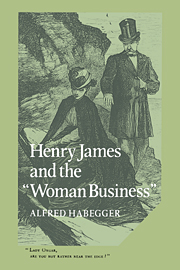Book contents
- Frontmatter
- Contents
- Acknowledgments
- Abbreviations
- 1 Introduction
- 2 The Lessons of the Father: Henry James, Sr., on Sexual Difference
- 3 Precocious Incest: First Novels by Louisa May Alcott and Henry James
- 4 The Chains of Literature: Elizabeth Stoddard and Henry James
- 5 Anne Moncure Crane Seemuller: Henry James's Jocasta
- 6 Minnie Temple's Death and the Birth of Henry James's Imagination
- 7 The Fatherless Heroine and the Filial Son: Deep Background for The Portrait of a Lady
- 8 The Return of the Father in The Bostonians
- 9 Conclusion
- Notes
- Works Cited
- Index
- Frontmatter
- Contents
- Acknowledgments
- Abbreviations
- 1 Introduction
- 2 The Lessons of the Father: Henry James, Sr., on Sexual Difference
- 3 Precocious Incest: First Novels by Louisa May Alcott and Henry James
- 4 The Chains of Literature: Elizabeth Stoddard and Henry James
- 5 Anne Moncure Crane Seemuller: Henry James's Jocasta
- 6 Minnie Temple's Death and the Birth of Henry James's Imagination
- 7 The Fatherless Heroine and the Filial Son: Deep Background for The Portrait of a Lady
- 8 The Return of the Father in The Bostonians
- 9 Conclusion
- Notes
- Works Cited
- Index
Summary
Although this book is not about James Joyce, the best avenue of approach to my subject is by way of the chapter in Ulysses known as “Nausicaa,” where a timid, deformed, and depressed girl named Gerty MacDowell sees Leopold Bloom on the beach and has an intense fantasy about him. Gerty imagines that the handsome middle-aged stranger remembers “an old flame he was in mourning for from the days beyond recall” (299), and she dreams that the two of them might each make up the other's loss: He would “love her, his ownest girlie, for herself alone” (294). The only two books Joyce mentions as being read with enjoyment by Gerty are The Lamplighter and Mabel Vaughan, both produced in the 1850s by the popular American novelist Maria Cummins. Evidently Cummins's euphemistic fictions channel Gerty's blocked carnality. The girl leans back and lets the unknown man look up her dress, while Bloom, also a fantasizing animal, seizes the opportunity to masturbate. After his orgasm, as Gerty limps away, he experiences the coarse epiphany – “O!” (301) – that explains her pathetic sexual compliance. She is lame.
“Nausicaa” enjoys a remarkable air of authority. Marilyn French may have spoken for most of Joyce's readers, male and female, when she concluded that “there is no question of Joyce's accuracy: the world of Gerty MacDowell is as true and recognizable as that of Barney Kiernan's pub” (157).
- Type
- Chapter
- Information
- Henry James and the 'Woman Business' , pp. 1 - 26Publisher: Cambridge University PressPrint publication year: 1989



